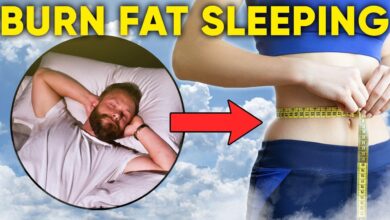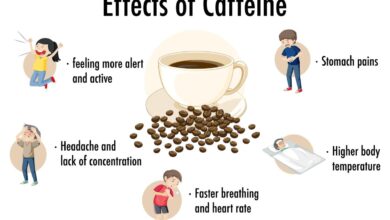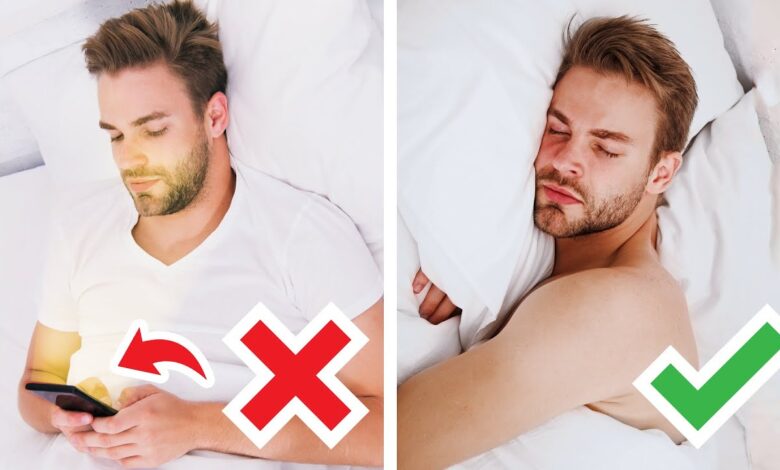
Surprising Habit Sabotages Sleep: Discover the Culprit
Surprising Habit Sabotages Sleep: We all know that a good night’s sleep is crucial for our health and well-being, but what if I told you that some seemingly harmless habits could be the culprits behind your sleep troubles? You might be surprised to learn that common activities, often enjoyed without a second thought, can actually wreak havoc on your sleep cycles.
From late-night snacking to indulging in a workout just before bed, we’ll explore the surprising habits that might be sabotaging your slumber.
The journey to a good night’s sleep begins with understanding how our bodies naturally regulate rest. Our internal clock, known as the circadian rhythm, dictates when we feel tired and when we feel alert. This rhythm is influenced by factors like light exposure, meal times, and even our social interactions.
But when we throw in habits that disrupt this delicate balance, we can find ourselves battling insomnia, fatigue, and even long-term health problems.
The Science of Sleep
Sleep is an essential biological process that plays a crucial role in our physical and mental well-being. Understanding the science behind sleep can help us appreciate its importance and make informed decisions about our sleep habits.
Circadian Rhythm and Sleep Regulation
Our sleep-wake cycle is regulated by an internal biological clock called the circadian rhythm. This natural rhythm, approximately 24 hours long, influences various bodily functions, including hormone production, body temperature, and alertness. The circadian rhythm is synchronized with the day-night cycle through environmental cues, primarily light exposure.
When light hits our eyes, it signals the brain to suppress the production of melatonin, a hormone that promotes sleep. As darkness approaches, melatonin levels rise, preparing the body for sleep.
Impact of Sleep Deprivation on Cognitive Function and Overall Health
Sleep deprivation can have significant negative consequences for our cognitive function and overall health. Chronic sleep loss can impair attention, memory, and decision-making abilities. It can also increase the risk of developing chronic diseases such as heart disease, stroke, diabetes, and obesity.
Sleep Stages and Their Contributions to Restoration
Sleep is not a single, uniform state but rather a complex process characterized by distinct stages. Each stage contributes to different aspects of physical and mental restoration.
You know how they say a good night’s sleep is essential for a healthy lifestyle? Well, I recently discovered a surprising habit that’s been sabotaging my sleep: late-night snacking. I’m working on curbing that, but to make up for the lost energy, I’ve been focusing on maximizing the fresh spring produce by using these five pantry staples I learned about in this great article: 5 pantry staples maximize spring produce.
It’s all about finding the balance, right? So, no more late-night snacking, and plenty of fresh spring produce!
Non-Rapid Eye Movement (NREM) Sleep
NREM sleep is divided into three stages:
- Stage 1:This is the transition from wakefulness to sleep, characterized by light sleep and a slowing of heart rate and breathing.
- Stage 2:This stage is characterized by deeper sleep, with further slowing of heart rate and breathing, and a decrease in brain activity.
- Stage 3:This is the deepest stage of sleep, also known as slow-wave sleep, where the brain produces slow, large brain waves, and the body is relaxed and still.
NREM sleep is crucial for physical restoration, including muscle repair, tissue growth, and hormone production.
Rapid Eye Movement (REM) Sleep
REM sleep is characterized by rapid eye movements, increased brain activity, and muscle paralysis. This stage is associated with dreaming and emotional processing.REM sleep is important for cognitive function, including memory consolidation, learning, and emotional regulation.
Common Sleep Saboteurs
You may be surprised to learn that many seemingly harmless habits can significantly disrupt your sleep. These sleep hygiene mistakes can range from late-night snacking to excessive screen time. While these actions might seem insignificant individually, they can accumulate and create a cascade of negative effects on your sleep quality.
The Impact of Caffeine, Alcohol, and Nicotine
Caffeine, alcohol, and nicotine are commonly consumed substances that can have a significant impact on your sleep. While they may seem like they can help you relax or stay awake, their effects on sleep quality can be detrimental.
- Caffeine:Caffeine is a stimulant that blocks adenosine, a neurotransmitter that promotes sleepiness. Consuming caffeine late in the day can interfere with your body’s natural sleep-wake cycle, making it harder to fall asleep and stay asleep.
- Alcohol:While alcohol may initially make you feel drowsy, it disrupts your sleep cycle. It can lead to fragmented sleep, making you wake up feeling groggy and unrested. Alcohol also inhibits REM sleep, which is essential for memory consolidation and emotional regulation.
- Nicotine:Nicotine is a stimulant that can disrupt sleep. It can make it difficult to fall asleep, and it can also lead to nightmares and early morning awakenings. Nicotine withdrawal can also cause sleep problems, especially for smokers who try to quit.
The Effects of Screen Time and Blue Light Exposure
Our modern lifestyles are filled with screen time, from smartphones and tablets to computers and televisions. The blue light emitted from these devices can interfere with your body’s production of melatonin, a hormone that regulates your sleep-wake cycle.
- Blue Light:Blue light suppresses melatonin production, making it harder to fall asleep. It also disrupts your circadian rhythm, the natural 24-hour cycle that regulates your sleep-wake patterns.
- Screen Time:Engaging with screens before bedtime can make it harder to fall asleep and stay asleep. The bright light from screens can suppress melatonin production and disrupt your sleep cycle.
Surprising Habits That Sabotage Sleep
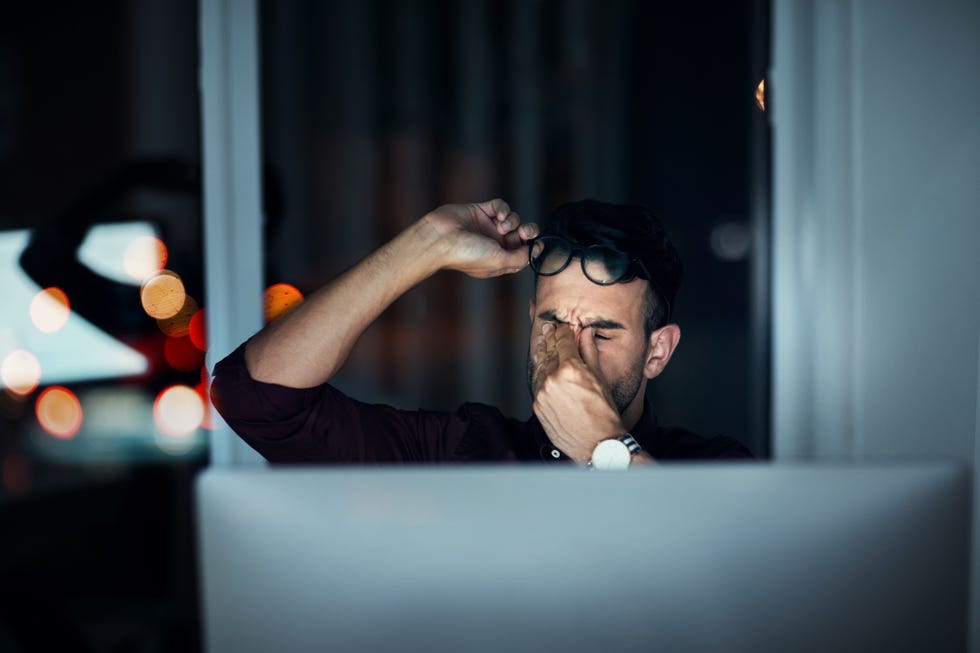
You might be surprised to learn that some seemingly harmless habits can significantly disrupt your sleep. While we often focus on obvious culprits like caffeine or screen time, there are other everyday activities that can silently undermine your sleep quality.
Let’s delve into three surprising habits that could be sabotaging your sleep and explore how to mitigate their impact.
Late-Night Snacking
Late-night snacking can disrupt your sleep in various ways. Consuming food close to bedtime can interfere with your body’s natural sleep-wake cycle, making it harder to fall asleep and stay asleep. The digestion process requires energy, which can increase your body temperature and keep you awake.
You might be surprised to learn that one of the biggest sleep saboteurs is actually your phone. The blue light emitted from screens can disrupt your natural sleep-wake cycle, making it harder to fall asleep and stay asleep. This is just one example of how our daily habits can negatively impact our sleep.
But it’s important to remember that sleep is crucial for overall health and well-being, so it’s worth taking a look at your habits and making adjustments. While we’re on the topic of health, have you ever noticed how certain buzzwords get thrown around?
Check out this article on 7 health buzzwords need stop using to learn more about some of these misleading terms. By understanding these buzzwords and their limitations, we can make more informed decisions about our health and well-being, which ultimately leads to better sleep.
Moreover, certain foods can exacerbate these effects. For example, sugary snacks and processed foods can cause blood sugar spikes, followed by crashes, further disrupting your sleep. Additionally, fatty foods take longer to digest, potentially leading to indigestion and discomfort that can keep you awake.To minimize the impact of late-night snacking, consider:
- Avoiding large meals within a few hours of bedtime.
- Opting for light and easily digestible snacks if you must eat before bed.
- Choosing protein-rich snacks, which can help stabilize blood sugar levels.
- Staying hydrated throughout the day, as dehydration can sometimes be mistaken for hunger.
Excessive Exercise Close to Bedtime
While regular exercise is crucial for overall health, engaging in vigorous physical activity too close to bedtime can interfere with your sleep. Exercise increases your body temperature and adrenaline levels, making it difficult to relax and fall asleep. It can also disrupt your natural sleep-wake cycle, making it harder to fall asleep at your usual time.
“For optimal sleep, aim to finish your workout at least three hours before bedtime.”
If you exercise late in the evening, consider:
- Choosing low-intensity activities like stretching or yoga.
- Taking a warm bath or shower to help cool down your body temperature.
- Engaging in relaxing activities like reading or listening to calming music before bed.
Exposure to Extreme Temperatures
Our bodies are incredibly sensitive to temperature fluctuations, and extreme temperatures can significantly disrupt our sleep. Sleeping in a room that is too hot or too cold can prevent you from reaching deep, restorative sleep stages. When it’s too hot, your body works harder to cool down, leading to restlessness and frequent awakenings.
Conversely, sleeping in a cold room can trigger shivering and make it challenging to fall asleep.
“The ideal room temperature for sleep is between 60 and 67 degrees Fahrenheit (15.5 and 19.4 degrees Celsius).”
You know how they say a good night’s sleep is crucial for a healthy lifestyle? Well, one surprising habit that sabotages my sleep is working out too close to bedtime. I used to think that a good workout would tire me out, but I’ve learned that it actually energizes me, making it harder to fall asleep.
This is especially true if I haven’t taken the time to cool down properly after my workout, something I used to think was optional. Turns out, doing a proper cool down can help regulate your body temperature and heart rate, making it easier to transition into sleep.
So, if you want to avoid a sleep-deprived night, make sure to give your body a chance to unwind before hitting the hay.
To create an optimal sleep environment, consider:
- Adjusting your thermostat to a comfortable temperature.
- Using light bedding that allows for proper airflow.
- Taking a warm bath or shower before bed to lower your core body temperature.
- Wearing breathable pajamas.
Strategies for Better Sleep
Now that we’ve explored the common sleep saboteurs, let’s dive into practical strategies for improving your sleep quality. By implementing these techniques, you can create a sleep-conducive environment and establish healthy habits that promote restful nights.
Creating a Relaxing Bedtime Routine
A consistent bedtime routine signals to your body that it’s time to wind down and prepare for sleep. By establishing a predictable sequence of activities, you can gradually transition from your day to a state of relaxation. Here’s a step-by-step guide to creating a soothing bedtime routine:
- Set a Regular Sleep Schedule:Go to bed and wake up around the same time each day, even on weekends, to regulate your body’s natural sleep-wake cycle (circadian rhythm).
- Dim the Lights:As the evening progresses, gradually reduce the amount of light in your environment. This signals to your brain to start producing melatonin, a sleep-regulating hormone.
- Create a Relaxing Atmosphere:Make your bedroom a sanctuary for sleep. Keep it cool, dark, and quiet. Consider using blackout curtains, earplugs, or a white noise machine to minimize distractions.
- Engage in Relaxing Activities:Incorporate calming activities into your bedtime routine, such as taking a warm bath, reading a book, listening to soothing music, or practicing gentle stretching.
- Avoid Screen Time:The blue light emitted from electronic devices can interfere with melatonin production and make it harder to fall asleep. Avoid using screens for at least an hour before bed.
Sleep-Promoting Foods and Beverages
Certain foods and beverages can promote relaxation and enhance sleep quality. By incorporating these options into your diet, you can support your body’s natural sleep processes.
- Chamomile Tea:This herbal tea is known for its calming properties and can help promote relaxation.
- Warm Milk:The tryptophan in milk can help increase serotonin and melatonin levels, which are important for sleep.
- Almonds:Almonds are rich in magnesium, a mineral that plays a crucial role in regulating sleep cycles.
- Tart Cherry Juice:Tart cherries are a natural source of melatonin, the sleep-regulating hormone.
- Kiwi:Kiwi fruit is packed with antioxidants and serotonin, both of which contribute to better sleep.
Relaxation Techniques for Sleep
Relaxation techniques can help calm your mind and body, making it easier to fall asleep and stay asleep. Here are some techniques and their potential benefits for sleep:
| Technique | Benefits for Sleep |
|---|---|
| Deep Breathing Exercises | Slows heart rate, reduces stress, and promotes relaxation. |
| Progressive Muscle Relaxation | Relieves tension by systematically tensing and relaxing muscle groups. |
| Meditation | Calms the mind, reduces anxiety, and promotes mindfulness. |
| Yoga | Improves flexibility, reduces stress, and promotes relaxation. |
| Guided Imagery | Creates a peaceful mental state by visualizing calming scenes. |
When to Seek Professional Help: Surprising Habit Sabotages Sleep
While most sleep issues can be addressed through lifestyle changes, some require the expertise of a sleep specialist. Recognizing the signs and symptoms of sleep disorders that necessitate medical attention is crucial for improving your sleep quality and overall well-being.
Role of Sleep Specialists
Sleep specialists, including pulmonologists, neurologists, and psychiatrists, are trained to diagnose and treat sleep disorders. They use a comprehensive approach to understand the underlying causes of sleep problems and develop personalized treatment plans. These specialists play a vital role in ensuring proper diagnosis and management of sleep disorders.
Benefits of Sleep Studies
Sleep studies, also known as polysomnograms, are essential tools used by sleep specialists to diagnose and monitor sleep disorders. These studies involve recording brain waves, eye movements, muscle activity, and breathing patterns during sleep.
Sleep studies provide valuable insights into sleep patterns, identifying abnormalities that may contribute to sleep disturbances.
- Polysomnography (PSG):This comprehensive test records various physiological parameters during sleep, including brain waves, eye movements, muscle activity, and breathing patterns. It helps diagnose sleep disorders like insomnia, sleep apnea, and restless legs syndrome.
- Multiple Sleep Latency Test (MSLT):This test measures how quickly a person falls asleep during the day. It is used to diagnose excessive daytime sleepiness, a symptom of disorders like narcolepsy.
- Maintenance of Wakefulness Test (MWT):This test assesses a person’s ability to stay awake during the day. It is used to diagnose disorders like insomnia and narcolepsy.
Signs and Symptoms of Sleep Disorders, Surprising habit sabotages sleep
- Excessive Daytime Sleepiness:Feeling tired and drowsy during the day, despite getting enough sleep at night.
- Insomnia:Difficulty falling asleep, staying asleep, or waking up too early.
- Sleep Apnea:Repeated pauses in breathing during sleep, often accompanied by snoring and gasping for air.
- Restless Legs Syndrome:Uncomfortable sensations in the legs, often accompanied by an urge to move them.
- Sleepwalking:Walking or performing other activities while asleep.
- Nightmares:Frightening dreams that wake a person up.
- Sleep Talking:Talking during sleep.
Closure
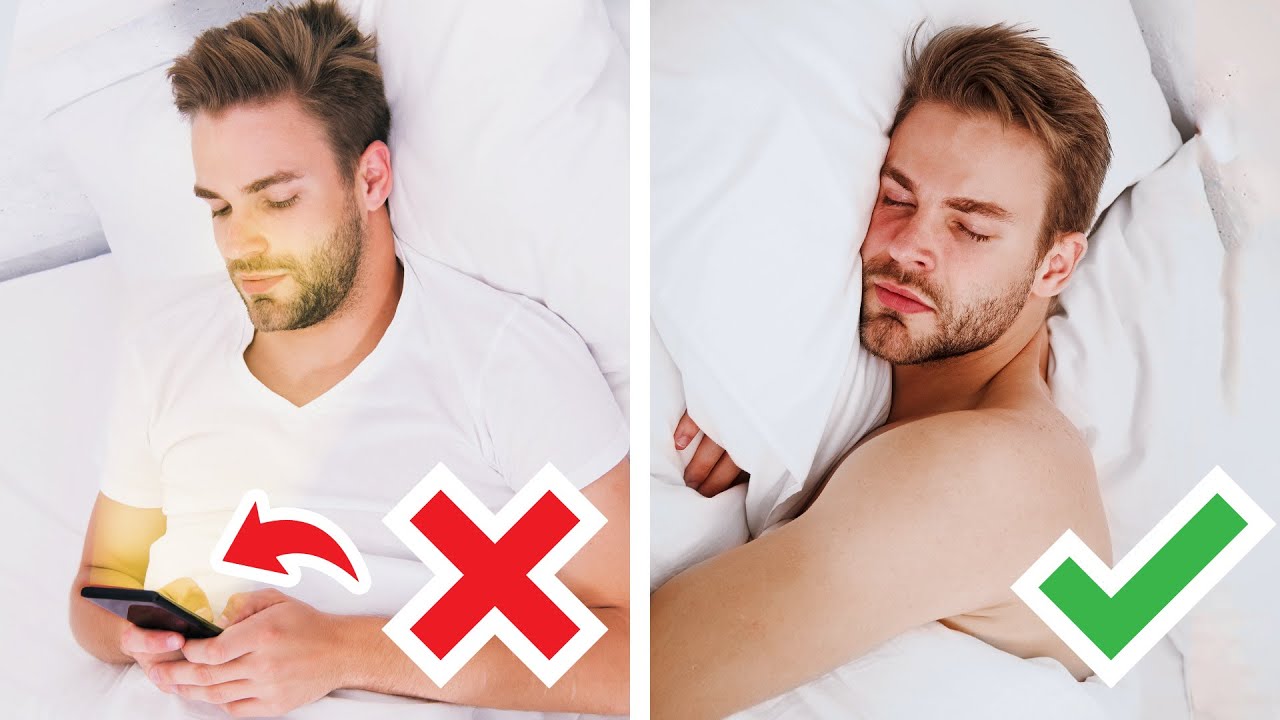
The journey to better sleep is a personal one, and finding the right strategies often involves a bit of trial and error. However, by becoming more aware of the surprising habits that might be sabotaging your sleep, you can take control and make positive changes.
Remember, sleep is a vital component of a healthy life, and by making simple adjustments to your routine, you can unlock the power of a good night’s rest. So, take a closer look at your habits, and see if you can identify any sleep saboteurs.
You might be surprised at what you discover.



